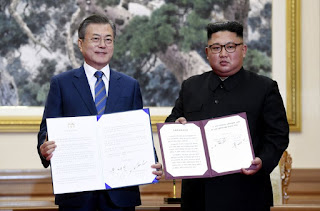On April 27, 2018, the top leaders of north and south Korea adopted the Panmunjom Declaration for Peace, Prosperity and Reunification of the Korean Peninsula reflecting the firm will to put an end to the long-standing division and confrontation, an outcome of the cold war, as early as possible, to courageously open a new era of national reconciliation, peace and prosperity and to improve and develop the north-south relations more proactively.
The international community extended full support to the historic summit meetings and talks of the north and the south, saying that they represented a big progress towards peace and security of the Korean peninsula and the rest of the world. There were positive movements for large-scale exchanges and cooperation between the north and the south. It was as if a balmy spring day had come.
The south Korean authorities, however, abandoned the implementation of the joint declaration and continued their abnormal anti-reunification actions in support of the hostile policy of the US towards the Democratic People’s Republic of Korea. It is no exaggeration to say that the current inter-Korean relations have been brought back to the time before the publication of the Panmunjom Declaration.
Although the south Korean authorities are now giving an impression as if they were concerned about the improvement of the inter-Korean relations by raising such inessential issues as cooperation in epidemic prevention and humanitarian field and individual tourism, they are actually going against the implementation of the north-south agreement on guaranteeing peace and military stability on the Korean peninsula in disregard of the north’s repeated warnings that they should stop introducing latest military hardware and waging joint military exercises with the US.
Worse still, they are getting more frantic about modernizing their armed forces labelling the north’s development of various conventional weapons, which pertains entirely to its independent rights, a “provocation.”
The Korean nation is now standing on the crucial crossroads of whether to advance along the road of peace and reunification after breaking the serious deadlock in the inter-Korean relations or to continue to suffer the pain resulting from national division in the vicious cycle of confrontation and danger of war.
Recently at the Eighth Congress of the Workers’ Party of Korea, the WPK’s General Secretary Kim Jong Un said that a new road towards improved inter-Korean relations based on firm trust and reconciliation could be paved only when the south Korean authorities strictly control and root out any abnormal and anti-reunification conducts and that the inter-Korean relations might return to a new starting point of peace and prosperity in the near future, as desired by all Korean compatriots, as they did in the spring three years ago, depending on the south Korean authorities’ attitude.
Whether the inter-Korean relations can be restored and invigorated or not entirely depends on the attitude of the south Korean authorities.

